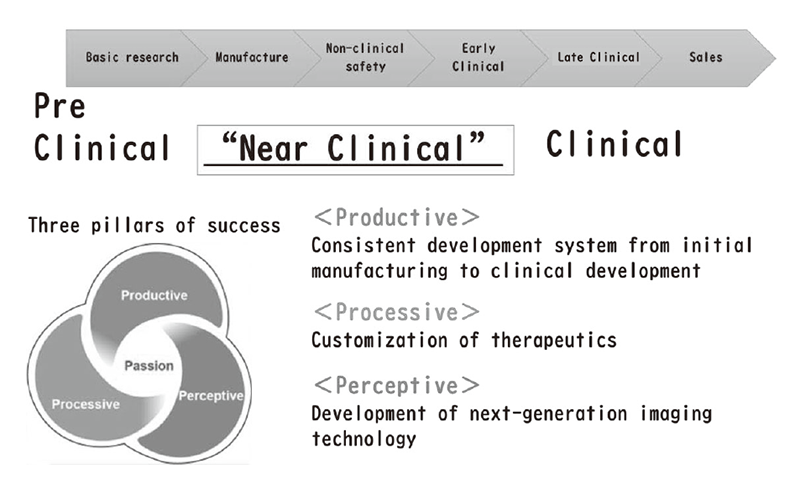Annual Report 2022
preface
- The Position of FY2022 in the History of EPOC
EPOC was established in 2012 as a Translational Research Institute, aiming to shift from "basic research" to "development" for clinical out-licensing. In April 2022, Prof. Toshihiko Doi became the Director of EPOC, and continues to promote the acceleration of “exit oriented research”. In clinical development, it is necessary to solve the following issues: 1) the importance of basic medical evidence, 2) the key to drug discovery is the co-creation of hospital and laboratory functions, and 3) the need for a center that links pre-clinical and clinical fields. The new goal of EPOC is to challenge the new field of "Near-Clinical" and to aim for the new concept of "Near-Clinical" (Figure 1).

- Staff Transfer
In July, Prof. Shumpei Ishikawa was appointed as a new director of the Division of Pathology to promote next-generation biomarker discovery research by utilizing AI to quantify high-dimensional information from histopathological images and spatial genomics data. In January, a new director, Anri Inaki, took over at the Division of Functional Imaging (Kashiwa), with a particular focus on research into nuclear medicine therapeutics using alpha-ray emitting karyoma, as well as a policy of establishing a platform that enables the domestic production of RI drugs and their clinical research. Prof. Akihiro Ohashi was transferred to Astellas Pharma Inc. as a Principal Investigator (PI) on a cross-appointment to conduct research within the company.
- EPOC Activities
Teijin Limited, Japan Tissue Engineering Co., Ltd. (J-TEC), Mitsui Fudosan Co., Ltd. and the National Cancer Center (NCC)-EPOC will jointly establish a regenerative medicine platform in Kashiwanoha Smart City. The platform supports the development of innovative treatments for diseases with unmet needs such as cancer. It serves as a one-stop system supporting research and development, business plan formulation, and commercial production of regenerative medicine products. In particular, the four partners aim to accelerate the commercialization of regenerative medicine and innovative treatments for cancer. As part of the plan, the partners already have begun to support seed holders.
Lecture-style seminars began with a three-part series on "The Frontiers of DDS and Nucleic Acid Delivery" given by Masahiro Yasunaga.
